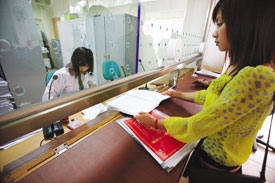Investors wary of red tape tangle
 |
| VIetnam’s business hub Ho Chi Minh City is crying out for red tape reduction |
“Formalities to obtain a business license for a foreign company are 15 times more difficult than for a local company, making any project very expensive,” said Alain Cany, chairman of EuroCham.
Cany, who was speaking at a seminar on Ho Chi Minh City’s 2011-2015 investment environment and opportunities last week, said these difficulties were well known but firms were seeing no improvement.
Responding to foreign investors’ complaints at the seminar, Ho Chi Minh City People’s Committee vice chairman Nguyen Trung Tin affirmed that the city was striving to reform administrative procedures. “But the city has 132,000 registered companies, which could lead to an overload in terms of administrative procedures,” he said.
Tin noted that most projects delayed at the procedural stage were in the real estate sector where a lot of time was needed to appraise both the ability of investors and the value of projects. “Such cases often involved real estate transactions between local and foreign companies with the investors not collaborating to reveal the real value of the property project because they wished to avoid paying tax.”
The European business community also used the seminar to highlight the infrastructure burdens and traffic jams that were having an impact on the business of foreign investors.
Bui Xuan Cuong, deputy director of the municipal Department of Transport, said Ho Chi Minh City lacked funds for infrastructure projects, resulting in severe traffic jams in the city.
“The city needs about $40 billion to develop infrastructure but the state can take on only 15 per cent of the required capital. We are looking for the other 85 per cent from other sources such as official development assistance (ODA) and private sector capital,” said Cuong.
The city is targeting three million a people using public transport systems per day, accounting for 15 per cent of transport demand against 1.4 million of people using public systems currently.
“As many of us know from our own experience, the improvement of roads and logistics infrastructure remains key,” said Cany, who spoke on behalf of the European companies which contributed 32 per cent of Ho Chi Minh City’s tax input last year.
Last year, 375 new foreign-backed projects worth $1.88 billion were licenced in the city while 115 operational projects increased their capital by an additional $443 million. In the first four months of 2011, the city has licenced 88 new projects worth $1.25 billion and 35 projects have raised their capital to the tune of $80 million.
Tin said over the next five years, the city would prioritise service sector investment to secure sustainable development and build a knowledge-based economy.
“We have passed the initial period of calling for investment to solve issues relating to the shortage of capital and cheap labour. At the new stage of development 2011-2015, we want to attract investments in sectors which are hi-tech and can bring about added values,” said Tin.
The southern hub is striving to hit a per-capita gross domestic product (GDP) of $4,800 in 2015 and set a GDP growth target of 12 per cent during 2011-2015, which is almost double the country’s average.
Ho Chi Minh City’s GDP last year was $21.2 billion, up 11.8 per cent year-on-year or 20 per cent of national GDP. Of this, 54 per cent came from the service sector, 45 per cent from industry and 1 per cent from agriculture.
What the stars mean:
★ Poor ★ ★ Promising ★★★ Good ★★★★ Very good ★★★★★ Exceptional
Related Contents
Latest News
More News
- Site clearance work launched for Dung Quat refinery upgrade (February 04, 2026 | 18:06)
- Masan High-Tech Materials reports profit: a view from Nui Phao mine (February 04, 2026 | 16:13)
- Hermes joins Long Thanh cargo terminal development (February 04, 2026 | 15:59)
- SCG enhances production and distribution in Vietnam (February 04, 2026 | 08:00)
- UNIVACCO strengthens Asia expansion with Vietnam facility (February 03, 2026 | 08:00)
- Cai Mep Ha Port project wins approval with $1.95bn investment (February 02, 2026 | 16:17)
- Repositioning Vietnam in Asia’s manufacturing race (February 02, 2026 | 16:00)
- Manufacturing growth remains solid in early 2026 (February 02, 2026 | 15:28)
- Navigating venture capital trends across the continent (February 02, 2026 | 14:00)
- Motivations to achieve high growth (February 02, 2026 | 11:00)

 Tag:
Tag:




















 Mobile Version
Mobile Version